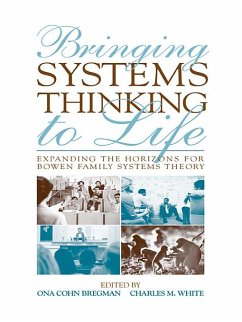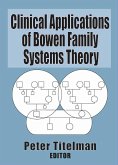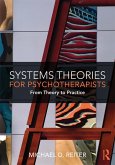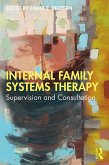Bringing Systems Thinking to Life (eBook, PDF)
Expanding the Horizons for Bowen Family Systems Theory
Redaktion: Bregman, Ona Cohn; White, Charles M.
49,95 €
49,95 €
inkl. MwSt.
Sofort per Download lieferbar

25 °P sammeln
49,95 €
Als Download kaufen

49,95 €
inkl. MwSt.
Sofort per Download lieferbar

25 °P sammeln
Jetzt verschenken
Alle Infos zum eBook verschenken
49,95 €
inkl. MwSt.
Sofort per Download lieferbar
Alle Infos zum eBook verschenken

25 °P sammeln
Bringing Systems Thinking to Life (eBook, PDF)
Expanding the Horizons for Bowen Family Systems Theory
Redaktion: Bregman, Ona Cohn; White, Charles M.
- Format: PDF
- Merkliste
- Auf die Merkliste
- Bewerten Bewerten
- Teilen
- Produkt teilen
- Produkterinnerung
- Produkterinnerung

Bitte loggen Sie sich zunächst in Ihr Kundenkonto ein oder registrieren Sie sich bei
bücher.de, um das eBook-Abo tolino select nutzen zu können.
Hier können Sie sich einloggen
Hier können Sie sich einloggen
Sie sind bereits eingeloggt. Klicken Sie auf 2. tolino select Abo, um fortzufahren.

Bitte loggen Sie sich zunächst in Ihr Kundenkonto ein oder registrieren Sie sich bei bücher.de, um das eBook-Abo tolino select nutzen zu können.
Bringing Systems Thinking to Life presents the breadth of applications of Bowen family systems therapy in a single volume. Presenting creative and innovative appications of Bowen theory, the book provides practitioners and stakeholders with a comprehensive understanding of human behavior and functioning at multiple levels of systemic organization.
- Geräte: PC
- mit Kopierschutz
- eBook Hilfe
- Größe: 3.47MB
Andere Kunden interessierten sich auch für
![Bringing Common Factors to Life in Couple and Family Therapy (eBook, PDF) Bringing Common Factors to Life in Couple and Family Therapy (eBook, PDF)]() Eli A. KaramBringing Common Factors to Life in Couple and Family Therapy (eBook, PDF)33,95 €
Eli A. KaramBringing Common Factors to Life in Couple and Family Therapy (eBook, PDF)33,95 €![Internal Family Systems Therapy with Children (eBook, PDF) Internal Family Systems Therapy with Children (eBook, PDF)]() Lisa SpiegelInternal Family Systems Therapy with Children (eBook, PDF)26,95 €
Lisa SpiegelInternal Family Systems Therapy with Children (eBook, PDF)26,95 €![Transitioning to Internal Family Systems Therapy (eBook, PDF) Transitioning to Internal Family Systems Therapy (eBook, PDF)]() Emma E. RedfernTransitioning to Internal Family Systems Therapy (eBook, PDF)33,95 €
Emma E. RedfernTransitioning to Internal Family Systems Therapy (eBook, PDF)33,95 €![Clinical Applications of Bowen Family Systems Theory (eBook, PDF) Clinical Applications of Bowen Family Systems Theory (eBook, PDF)]() Peter TitelmanClinical Applications of Bowen Family Systems Theory (eBook, PDF)72,95 €
Peter TitelmanClinical Applications of Bowen Family Systems Theory (eBook, PDF)72,95 €![Systems Theories for Psychotherapists (eBook, PDF) Systems Theories for Psychotherapists (eBook, PDF)]() Michael D. ReiterSystems Theories for Psychotherapists (eBook, PDF)42,95 €
Michael D. ReiterSystems Theories for Psychotherapists (eBook, PDF)42,95 €![Internal Family Systems Therapy (eBook, PDF) Internal Family Systems Therapy (eBook, PDF)]() Internal Family Systems Therapy (eBook, PDF)33,95 €
Internal Family Systems Therapy (eBook, PDF)33,95 €![Single Session Thinking and Practice in Global, Cultural, and Familial Contexts (eBook, PDF) Single Session Thinking and Practice in Global, Cultural, and Familial Contexts (eBook, PDF)]() Single Session Thinking and Practice in Global, Cultural, and Familial Contexts (eBook, PDF)37,95 €
Single Session Thinking and Practice in Global, Cultural, and Familial Contexts (eBook, PDF)37,95 €-
-
-
Bringing Systems Thinking to Life presents the breadth of applications of Bowen family systems therapy in a single volume. Presenting creative and innovative appications of Bowen theory, the book provides practitioners and stakeholders with a comprehensive understanding of human behavior and functioning at multiple levels of systemic organization.
Dieser Download kann aus rechtlichen Gründen nur mit Rechnungsadresse in A, B, BG, CY, CZ, D, DK, EW, E, FIN, F, GR, HR, H, IRL, I, LT, L, LR, M, NL, PL, P, R, S, SLO, SK ausgeliefert werden.
Produktdetails
- Produktdetails
- Verlag: Taylor & Francis eBooks
- Seitenzahl: 430
- Erscheinungstermin: 7. Januar 2011
- Englisch
- ISBN-13: 9781136905032
- Artikelnr.: 38279895
- Verlag: Taylor & Francis eBooks
- Seitenzahl: 430
- Erscheinungstermin: 7. Januar 2011
- Englisch
- ISBN-13: 9781136905032
- Artikelnr.: 38279895
- Herstellerkennzeichnung Die Herstellerinformationen sind derzeit nicht verfügbar.
Ona Cohn Bregman, MSS is former Associate Professor of Social Work at Syracuse University, chair of the School of Social Work's Family Mental Health Concentration from 1991 to 1998, selected by her peers as "Social Work Teacher of the Year" in 1995, and served on the board of the Syracuse Family Center from 1991 to 2001. The Mental Health Association of Onondaga County, NY awarded Ms. Bregman their Lifetime Achievement award in 2007. She continues a small clinical and supervisory practice in semi-retirement. Charles M. White, MSW, is a social work field liaison with Rutgers University's School of Social Work (New Brunswick and Newark, NJ) and a doctoral student at Rutgers University's Graduate School--New Brunswick. He also maintains a Bowen theory-based psychotherapy, supervision, consultation, and training practice in Westfield, NJ. Since completing his Master of Social Work degree at Syracuse University in 1992, Mr. White has held several clinical, supervisory, research, and adjunct academic positions.
Section I: Theoretical Considerations in Learning Systems Thinking and
Bowen Theory. Comella, Observing Emotional Functioning in Human
Relationship Systems: Lessons from Murray Bowen's Writings. Bourne,
Various Theoretical Points People Miss: A Training Session by Dr. Murray
Bowen at the Minnesota Institute of Family Dynamics. Kerr, An Obstacle to
"Hearing" Bowen Theory. Papero, Responsibility for Self. Harrison, Live
Learning: Differentiation of Self as the Basis for Learning. Friesen,
Lester, A Systems View of the Training Program at the Bowen Center: Guiding
Principles (1990-2003). Bregman, Managing Self in Emotional Fields when
Presenting Bowen Theory. Section II: Established Domains for Systems
Thinking and Bowen Theory. White, Learners Without Teachers: The
Simultaneous Learning About Self-functioning and Bowen Theory by
Supervisor, Staff, Interns, and Clients in an Outpatient Program. Howard,
Clarifying Principles for Investing in Self. Hall, Can Undergraduates Learn
Bowen Theory? Wilgus, Incorporating Bowen Theory into an Undergraduate
Social Work Curriculum: An Exercise in the Responsible Management of Self.
Kerr, Bowen Theory in Undergraduate and Graduate Nursing Education. Frost,
Thinking Systems in Pastoral Training. Crimone, Hester, Across the
Generations: The Training of Clergy and Congregations. Papero, How Bowen
Theory Can be Useful to People in the Workplace: A Conversation with Kathy
Wiseman and Dan Papero. Norton, Bringing Bowen Theory to Family Business.
Romig, Bowen System Theory and the Chain Reaction of Bad Leadership and
Good Leadership. Engels, Introducing Bowen Theory to Business Leaders.
Bourne, Misunderstandings from the Family Field: Selected Segments by Dr.
Murray Bowen at the Minnesota Institute of Family Dynamics. Section III:
New Horizons for Systems Thinking and Bowen Theory. Lester, Integrating
Bowen Theory with Academic Research, Teaching, and Service. Hargrove, The
Critical Reader as a Scientist: Approaching Literature from the Perspective
of Bowen Theory. Schur, A Supervision Model Based in Bowen Theory and
Language. Knauth, Introducing Adolescents to Systems Thinking: Learning to
See the Self as Part of a System. Baker, Titleman, Bowen Theory in Russia:
A Training Program for Russian Psychologists. Brown, Restless Bedfellows:
Taking Bowen Theory into a Child-focused Adolescent Treatment Unit in
Australia. Kolski-Andreaco, Learning Bowen Theory from a Distance. Nel,
Bowen Theory and Zulu Understanding of Family. Howard, Building Bridges
into the Natural Sciences: Field Research on Harvester Ants. Greenberg,
Social Behavior in Nonhuman Animals: A Behavioral Model of Proximate
Mechanisms Based on Bowen Theory. Bourne, A Science of Human Behavior for
the Future: Selected Segments by Dr. Murray Bowen at the Minnesota
Institute of Family Dynamics. Appendix: Bowen Theory Training Centers &
Contributor Organizations.
Bowen Theory. Comella, Observing Emotional Functioning in Human
Relationship Systems: Lessons from Murray Bowen's Writings. Bourne,
Various Theoretical Points People Miss: A Training Session by Dr. Murray
Bowen at the Minnesota Institute of Family Dynamics. Kerr, An Obstacle to
"Hearing" Bowen Theory. Papero, Responsibility for Self. Harrison, Live
Learning: Differentiation of Self as the Basis for Learning. Friesen,
Lester, A Systems View of the Training Program at the Bowen Center: Guiding
Principles (1990-2003). Bregman, Managing Self in Emotional Fields when
Presenting Bowen Theory. Section II: Established Domains for Systems
Thinking and Bowen Theory. White, Learners Without Teachers: The
Simultaneous Learning About Self-functioning and Bowen Theory by
Supervisor, Staff, Interns, and Clients in an Outpatient Program. Howard,
Clarifying Principles for Investing in Self. Hall, Can Undergraduates Learn
Bowen Theory? Wilgus, Incorporating Bowen Theory into an Undergraduate
Social Work Curriculum: An Exercise in the Responsible Management of Self.
Kerr, Bowen Theory in Undergraduate and Graduate Nursing Education. Frost,
Thinking Systems in Pastoral Training. Crimone, Hester, Across the
Generations: The Training of Clergy and Congregations. Papero, How Bowen
Theory Can be Useful to People in the Workplace: A Conversation with Kathy
Wiseman and Dan Papero. Norton, Bringing Bowen Theory to Family Business.
Romig, Bowen System Theory and the Chain Reaction of Bad Leadership and
Good Leadership. Engels, Introducing Bowen Theory to Business Leaders.
Bourne, Misunderstandings from the Family Field: Selected Segments by Dr.
Murray Bowen at the Minnesota Institute of Family Dynamics. Section III:
New Horizons for Systems Thinking and Bowen Theory. Lester, Integrating
Bowen Theory with Academic Research, Teaching, and Service. Hargrove, The
Critical Reader as a Scientist: Approaching Literature from the Perspective
of Bowen Theory. Schur, A Supervision Model Based in Bowen Theory and
Language. Knauth, Introducing Adolescents to Systems Thinking: Learning to
See the Self as Part of a System. Baker, Titleman, Bowen Theory in Russia:
A Training Program for Russian Psychologists. Brown, Restless Bedfellows:
Taking Bowen Theory into a Child-focused Adolescent Treatment Unit in
Australia. Kolski-Andreaco, Learning Bowen Theory from a Distance. Nel,
Bowen Theory and Zulu Understanding of Family. Howard, Building Bridges
into the Natural Sciences: Field Research on Harvester Ants. Greenberg,
Social Behavior in Nonhuman Animals: A Behavioral Model of Proximate
Mechanisms Based on Bowen Theory. Bourne, A Science of Human Behavior for
the Future: Selected Segments by Dr. Murray Bowen at the Minnesota
Institute of Family Dynamics. Appendix: Bowen Theory Training Centers &
Contributor Organizations.
Section I: Theoretical Considerations in Learning Systems Thinking and
Bowen Theory. Comella, Observing Emotional Functioning in Human
Relationship Systems: Lessons from Murray Bowen's Writings. Bourne,
Various Theoretical Points People Miss: A Training Session by Dr. Murray
Bowen at the Minnesota Institute of Family Dynamics. Kerr, An Obstacle to
"Hearing" Bowen Theory. Papero, Responsibility for Self. Harrison, Live
Learning: Differentiation of Self as the Basis for Learning. Friesen,
Lester, A Systems View of the Training Program at the Bowen Center: Guiding
Principles (1990-2003). Bregman, Managing Self in Emotional Fields when
Presenting Bowen Theory. Section II: Established Domains for Systems
Thinking and Bowen Theory. White, Learners Without Teachers: The
Simultaneous Learning About Self-functioning and Bowen Theory by
Supervisor, Staff, Interns, and Clients in an Outpatient Program. Howard,
Clarifying Principles for Investing in Self. Hall, Can Undergraduates Learn
Bowen Theory? Wilgus, Incorporating Bowen Theory into an Undergraduate
Social Work Curriculum: An Exercise in the Responsible Management of Self.
Kerr, Bowen Theory in Undergraduate and Graduate Nursing Education. Frost,
Thinking Systems in Pastoral Training. Crimone, Hester, Across the
Generations: The Training of Clergy and Congregations. Papero, How Bowen
Theory Can be Useful to People in the Workplace: A Conversation with Kathy
Wiseman and Dan Papero. Norton, Bringing Bowen Theory to Family Business.
Romig, Bowen System Theory and the Chain Reaction of Bad Leadership and
Good Leadership. Engels, Introducing Bowen Theory to Business Leaders.
Bourne, Misunderstandings from the Family Field: Selected Segments by Dr.
Murray Bowen at the Minnesota Institute of Family Dynamics. Section III:
New Horizons for Systems Thinking and Bowen Theory. Lester, Integrating
Bowen Theory with Academic Research, Teaching, and Service. Hargrove, The
Critical Reader as a Scientist: Approaching Literature from the Perspective
of Bowen Theory. Schur, A Supervision Model Based in Bowen Theory and
Language. Knauth, Introducing Adolescents to Systems Thinking: Learning to
See the Self as Part of a System. Baker, Titleman, Bowen Theory in Russia:
A Training Program for Russian Psychologists. Brown, Restless Bedfellows:
Taking Bowen Theory into a Child-focused Adolescent Treatment Unit in
Australia. Kolski-Andreaco, Learning Bowen Theory from a Distance. Nel,
Bowen Theory and Zulu Understanding of Family. Howard, Building Bridges
into the Natural Sciences: Field Research on Harvester Ants. Greenberg,
Social Behavior in Nonhuman Animals: A Behavioral Model of Proximate
Mechanisms Based on Bowen Theory. Bourne, A Science of Human Behavior for
the Future: Selected Segments by Dr. Murray Bowen at the Minnesota
Institute of Family Dynamics. Appendix: Bowen Theory Training Centers &
Contributor Organizations.
Bowen Theory. Comella, Observing Emotional Functioning in Human
Relationship Systems: Lessons from Murray Bowen's Writings. Bourne,
Various Theoretical Points People Miss: A Training Session by Dr. Murray
Bowen at the Minnesota Institute of Family Dynamics. Kerr, An Obstacle to
"Hearing" Bowen Theory. Papero, Responsibility for Self. Harrison, Live
Learning: Differentiation of Self as the Basis for Learning. Friesen,
Lester, A Systems View of the Training Program at the Bowen Center: Guiding
Principles (1990-2003). Bregman, Managing Self in Emotional Fields when
Presenting Bowen Theory. Section II: Established Domains for Systems
Thinking and Bowen Theory. White, Learners Without Teachers: The
Simultaneous Learning About Self-functioning and Bowen Theory by
Supervisor, Staff, Interns, and Clients in an Outpatient Program. Howard,
Clarifying Principles for Investing in Self. Hall, Can Undergraduates Learn
Bowen Theory? Wilgus, Incorporating Bowen Theory into an Undergraduate
Social Work Curriculum: An Exercise in the Responsible Management of Self.
Kerr, Bowen Theory in Undergraduate and Graduate Nursing Education. Frost,
Thinking Systems in Pastoral Training. Crimone, Hester, Across the
Generations: The Training of Clergy and Congregations. Papero, How Bowen
Theory Can be Useful to People in the Workplace: A Conversation with Kathy
Wiseman and Dan Papero. Norton, Bringing Bowen Theory to Family Business.
Romig, Bowen System Theory and the Chain Reaction of Bad Leadership and
Good Leadership. Engels, Introducing Bowen Theory to Business Leaders.
Bourne, Misunderstandings from the Family Field: Selected Segments by Dr.
Murray Bowen at the Minnesota Institute of Family Dynamics. Section III:
New Horizons for Systems Thinking and Bowen Theory. Lester, Integrating
Bowen Theory with Academic Research, Teaching, and Service. Hargrove, The
Critical Reader as a Scientist: Approaching Literature from the Perspective
of Bowen Theory. Schur, A Supervision Model Based in Bowen Theory and
Language. Knauth, Introducing Adolescents to Systems Thinking: Learning to
See the Self as Part of a System. Baker, Titleman, Bowen Theory in Russia:
A Training Program for Russian Psychologists. Brown, Restless Bedfellows:
Taking Bowen Theory into a Child-focused Adolescent Treatment Unit in
Australia. Kolski-Andreaco, Learning Bowen Theory from a Distance. Nel,
Bowen Theory and Zulu Understanding of Family. Howard, Building Bridges
into the Natural Sciences: Field Research on Harvester Ants. Greenberg,
Social Behavior in Nonhuman Animals: A Behavioral Model of Proximate
Mechanisms Based on Bowen Theory. Bourne, A Science of Human Behavior for
the Future: Selected Segments by Dr. Murray Bowen at the Minnesota
Institute of Family Dynamics. Appendix: Bowen Theory Training Centers &
Contributor Organizations.







